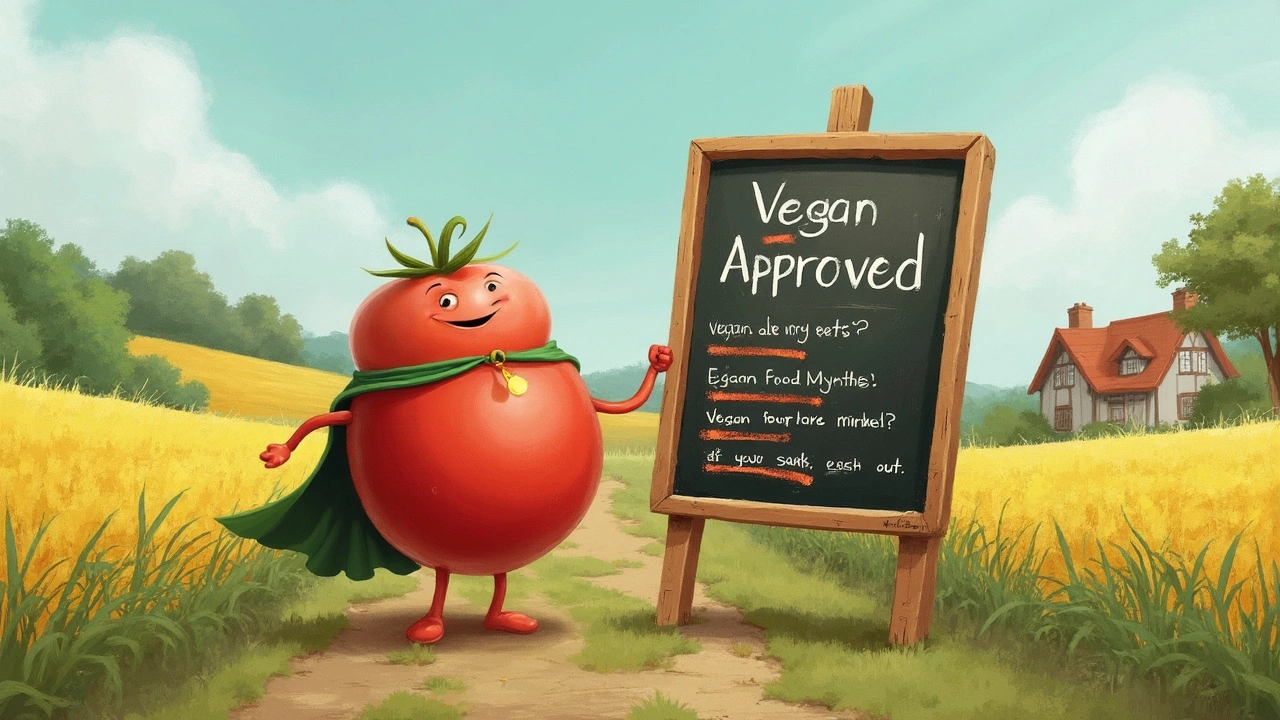If you’ve heard someone say, “Vegans don’t eat tomatoes,” you’re not alone. It pops up on forums and sometimes turns up in casual conversations, and it honestly just confuses people starting out with plant-based eating. So, where did this idea come from, and does it hold any truth?
First things first—yes, vegans absolutely eat tomatoes. Fresh, sun-dried, pureed, roasted, you name it. Tomatoes are practically a vegan staple, showing up in everything from pasta sauces to salads. The confusion usually comes from mixing up facts about certain other foods—like honey or figs—that might be off-limits for some vegans, but tomatoes aren’t part of that list.
If you’re just switching to plant-based or vegan eating, don’t stress about tomatoes. They’re not only safe but loaded with nutrients like vitamin C, lycopene, and potassium that make meals both tasty and healthy. If you want to get the most out of them, try heirloom varieties for better flavor and always check your supermarket for ripe local options. Now, let's look into how this weird tomato myth got started and what it says about the vegan movement overall.
- Where Did the Tomato Rumor Start?
- What Do Vegans Really Eat?
- Tomatoes and the Vegan Diet
- Tips for Tomato Lovers Going Vegan
Where Did the Tomato Rumor Start?
This tomato rumor has been floating around the internet for a while, but it has zero roots in the vegan community. Most folks trace it back to a jumble of fake facts, jokes, and online mixups. There’s actually no part of standard vegan guidelines that bans tomatoes. You might see people repeating old social media posts or memes claiming vegans avoid tomatoes because of how they’re picked, but this isn’t an official stance for veganism at all.
Some confusion probably comes from discussions about figs or even avocados. For instance, the vegan community has sometimes debated figs because they naturally involve wasps in their pollination cycle. People stretched these arguments and randomly lumped in foods like tomatoes without looking at the real facts. There’s also a little confusion between organic food rules and vegan rules. Organic standards sometimes talk about pesticides and animal labor, but vegans are mainly focused on avoiding animal products, not fruits or how they’re grown.
Here’s a quick look at the actual stance of some leading vegan organizations:
| Organization | Stance on Tomatoes |
|---|---|
| The Vegan Society | No restrictions. Tomatoes are totally fine. |
| People for the Ethical Treatment of Animals (PETA) | Tomatoes welcome in vegan meals. |
| Vegan Action | No mention of tomatoes as a problem food. |
The bottom line? Tomatoes have never been on the vegan blacklist. The main thing about being vegan is staying away from animal-based stuff, not skipping delicious, nutrient-packed fruits and veggies.
What Do Vegans Really Eat?
If you picture a vegan eating nothing but salad greens, you’re missing the big picture. Plant-based diets these days are anything but boring. Vegans fill their plates with all sorts of plants—fruits, vegetables, grains, beans, nuts, and seeds. In other words, way more than just lettuce and tofu.
Let’s break down what actually goes into a typical vegan diet:
- Whole grains like brown rice, quinoa, oats, and bulgur
- Fruits and vegetables—think broccoli, berries, bananas, kale, carrots, and, yes, tomatoes
- Legumes: chickpeas, black beans, lentils, white beans, and peas
- Nuts and seeds—almonds, walnuts, pumpkin seeds, chia seeds, and sunflower seeds
- Plant-based alternatives: tofu, tempeh, seitan, and vegan versions of cheese or yogurt
- Healthy fats like avocado, olive oil, and coconut
With so much variety, vegan meals can be hearty and satisfying. In fact, a recent report from the U.S. Department of Agriculture found that vegans actually eat more fiber and vitamins A, C, and E than people on a typical Western diet. The table below gives a quick comparison:
| Nutrient | Average Vegan Intake | Standard Western Diet Intake |
|---|---|---|
| Dietary Fiber (g/day) | 35 | 15 |
| Vitamin C (mg/day) | 110 | 80 |
| Lycopene (mg/day) | 12 | 6 |
Vegans are always experimenting, too. There are creative swaps for just about everything—vegan burgers, pizza with cashew cheese, dairy-free creamy pasta, and even plant-based desserts. The key is getting familiar with plant proteins and whole foods. Get into meal prepping, and you’ll never run out of solid ideas for breakfast, lunch, or dinner.
Ingredient labels matter if you’re going vegan. Watch out for hidden animal products—like gelatin or whey—that sometimes sneak into snacks or packaged foods. Lots of accidental “vegan junk food” exists today, but loading up on veggies, beans, and grains is the sure way to stay on the healthy side of plant-based eating.

Tomatoes and the Vegan Diet
So let’s clear it up for good: tomatoes are totally vegan-friendly. They’re a fruit (yeah, not a veggie!) that grows on vines and comes straight from plants, with zero animal involvement anywhere in the process. There’s no weird farming practice, animal product, or hidden ingredient to worry about with standard tomatoes. If you’re sticking to a vegan way of eating, you’re safe piling tomatoes on your plate.
Tomatoes are loaded with vitamins and minerals that vegans need. You get vitamin C, which helps with iron absorption—a big deal for plant-based eaters. Lycopene, that red pigment, is great for your skin and heart. Here’s a quick nutrition breakdown for one medium raw tomato:
| Nutrient | Amount per 1 medium (123g) |
|---|---|
| Calories | 22 |
| Vitamin C | 17 mg (19% Daily Value) |
| Potassium | 292 mg (6% DV) |
| Vitamin K | 10 mcg (8% DV) |
| Lycopene | ~3000 mcg |
Worried about pesticides? You can go organic or just give tomatoes a good rinse or soak in water with a splash of vinegar. If you’re buying processed tomato products like sauces, always check labels for weird animal-based additives like dairy (in creamy sauces) or anchovies (in some pasta sauces).
There’s a lot you can do with tomatoes on a vegan diet. Toss them raw in salads, roast them with olive oil, or make them into a simple salsa. For best results, slice tomatoes right before eating—this keeps their flavor and avoids soggy sandwiches.
- Try heirloom varieties for stronger taste
- Store tomatoes at room temperature for better texture
- Use cherry tomatoes for quick snacks or roasting
- Blend them into soups or raw sauces for a fresh kick
The bottom line: tomatoes are a powerhouse for vegans, both for nutrients and flavor. No need to hold back—just double check those labels once things get processed or packaged.
Tips for Tomato Lovers Going Vegan
Switching to a vegan diet doesn’t mean you have to ditch tomatoes—in fact, you might start eating more of them. Tomatoes pack a punch with vitamin C, potassium, and a unique antioxidant called lycopene, which has been studied for helping lower the risk of heart disease. For a lot of new vegans, tomatoes end up as the main ingredient in sauces, soups, and even breakfast dishes.
If you want to make the most of tomatoes as a vegan staple, follow these helpful tips:
- Pick in-season, local varieties: Tomatoes taste way better when they’re fresh and in season. Check out farmers markets for heritage breeds that have more flavor and fewer chemicals.
- Store them right: Don’t stick ripe tomatoes in the fridge—they’ll lose flavor and get mushy. Instead, leave them on the counter and eat within a few days.
- Try sun-dried or oven-roasting: If raw isn’t your thing, sun-dried or roasted tomatoes add a punchy flavor to salads, pizzas, and vegan sandwiches. Just check labels for non-vegan oil or additives if you buy packaged kinds.
- Watch out for unexpected animal products: Sometimes pre-made tomato sauces or canned tomatoes have cheese flavoring or other sneaky dairy ingredients. Just flip the can and check the label before tossing it in your basket.
Tomatoes are super versatile, so here are quick plant-based ideas:
- Pile them on your avocado toast for extra zing.
- Blend with cashew cream and basil to make a quick vegan tomato soup.
- Whip up spicy salsa with chopped tomatoes, red onion, and cilantro.
- Roast grape tomatoes with a drizzle of olive oil as an easy snack.
Check out this table for a quick look at nutrients in just one medium raw tomato (about 123g):
| Nutrient | Amount |
|---|---|
| Calories | 22 |
| Vitamin C | 17mg (19% DV) |
| Potassium | 292mg (6% DV) |
| Lycopene | ~3 mg |
| Fiber | 1.5g (5% DV) |
Whether you’re tossing them into a quick salad or simmering up a big pot of sauce, tomatoes have your back when you’re building tasty vegan meals.

